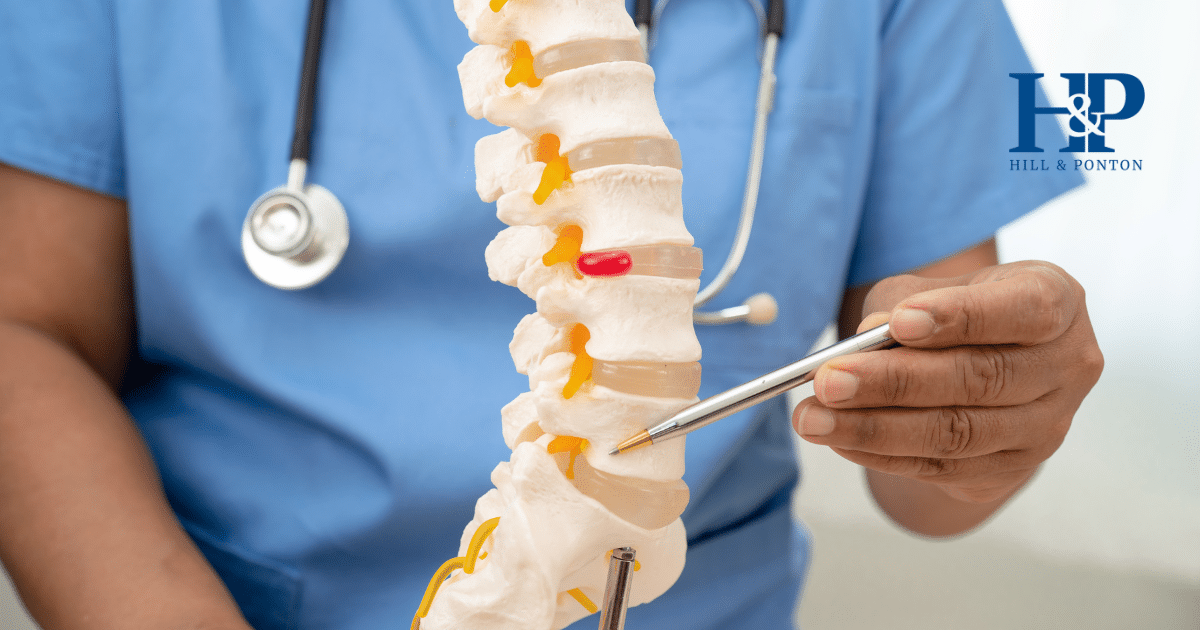Intervertebral Disc Syndrome (IVDS) is a spinal condition involving the intervertebral discs or disc fragments, which may become displaced in the lumbar, cervical, or thoracic areas of the spine.
IVDS is a common cause of back pain and is often aggravated by prolonged sitting or bending. This condition can lead to nerve pain radiating to other areas of the body, such as the legs, arms, or along the sciatic nerve. Sciatica, characterized by pain along the sciatic nerve, is a frequent complication of IVDS.
In addition to causing limited motion, IVDS may lead to more severe issues such as bladder or bowel dysfunction. Men with IVDS may also experience erectile dysfunction as a side effect.
This guide will explore how the VA rates intervertebral disc syndrome and what veterans need to know to pursue disability benefits for this condition.
How Does the VA Rate Intervertebral Disc Syndrome (IVDS)?
The VA evaluates IVDS under Diagnostic Code 5243, primarily focusing on the severity of incapacitating episodes requiring bed rest and treatment prescribed by a physician over the past 12 months.
What Qualifies as an Incapacitating Episode?
An incapacitating episode involves acute symptoms of IVDS severe enough that a physician prescribes specific treatment and recommends bed rest. This definition is critical because only physician-ordered bed rest counts toward the VA rating.
IVDS Ratings and Criteria
The VA assigns disability ratings for IVDS based on the cumulative duration of incapacitating episodes over a 12-month period:
- 10% Rating: Total incapacitating episodes last between 1 and 2 weeks in the past year.
- 20% Rating: Total incapacitating episodes last between 2 and 4 weeks in the past year.
- 40% Rating: Total incapacitating episodes last between 4 and 6 weeks in the past year.
- 60% Rating: Total incapacitating episodes last at least 6 weeks in the past year.
What Determines Your Rating?
The VA will use information from your physician, including documented treatments, prescribed bed rest, and the frequency and duration of episodes, to determine your IVDS disability rating. Accurate medical records and evidence of your symptoms’ impact are essential to securing the correct rating.
If you feel your rating doesn’t accurately reflect the severity of your IVDS, you have the option to appeal.
Service Connection for Intervertebral Disc Syndrome
To receive VA disability compensation for Intervertebral Disc Syndrome (IVDS), you must demonstrate a service connection. Establishing this connection is often most straightforward through direct service connection, requiring evidence that the condition resulted directly from your time in the military.
Three Key Elements for Direct Service Connection
- Current Diagnosis: You must have a documented diagnosis of IVDS from a medical professional.
- In-Service Event or Incident: Provide evidence of an event, injury, or circumstances during your service that led to the development or aggravation of IVDS.
- Medical Nexus: Submit a medical opinion linking your diagnosed IVDS to the in-service event or injury.
Your VA doctor can help you compile and present the necessary evidence, including medical records and a nexus statement, to support your claim.
Secondary Service Connection for IVDS
If IVDS cannot be directly linked to your service, you may still establish a secondary service connection. This applies when your IVDS is caused or aggravated by a condition that is already recognized as service-connected.
For example, if you developed IVDS years after discharge, it might not qualify for direct service connection. However, if a service-connected injury like whiplash led to disc degeneration and ultimately IVDS, you may be eligible for compensation through secondary service connection.
Service Connection by Aggravation
Even if you had IVDS before joining the military, you may still qualify for VA benefits if your time in service aggravated the condition. To establish service connection by aggravation, you need to show:
- A pre-existing diagnosis of IVDS before service.
- Medical evidence that your service worsened the condition beyond its natural progression.
Your doctor will need to provide a statement confirming that your military duties or circumstances directly contributed to the worsening of your IVDS.
By presenting comprehensive evidence, veterans can pursue compensation through these various service connection pathways.
Compensation & Pension (C&P) Exams for Intervertebral Disc Syndrome (IDS)
A Compensation & Pension (C&P) exam is often required to receive a VA disability rating for IVDS. After submitting your claim to your regional VA office, they will review the information provided and determine if a C&P exam is necessary.
What to Expect During a C&P Exam for IVDS
The C&P exam is conducted by a VA-hired physician to assess your symptoms, gather additional details, and confirm a diagnosis. This process typically includes:
- Symptom Review: The doctor will ask questions about your pain, mobility limitations, and any other symptoms associated with your IVDS.
- Discussion of Military Duties and Service Connection: You’ll be asked to provide details about your military service, including specific incidents or duties that may have caused or aggravated your IVDS.
- Physical Assessment: While not a treatment exam, the doctor may perform a basic physical evaluation to assess your range of motion and other functional limitations.
Purpose of the Exam
The C&P exam doctor’s role is solely to document findings and provide a detailed report to the regional office. They are not there to provide treatment or ongoing care. The doctor may also evaluate whether other conditions besides IVDS could be contributing to your symptoms.
After the Exam
Once the exam is complete, the findings will be forwarded to the VA’s regional office (RO). The RO will review the report and decide the next steps for your claim, including whether a disability rating will be assigned or additional evidence is required.
Pro Tip: Veterans should be honest and thorough when describing their symptoms and the impact of IVDS on daily life during the exam. If your claim is denied or you receive an unfavorable rating, you have the right to appeal the decision.
TDIU for Intervertebral Disc Syndrome (IVDS)
Total Disability Individual Unemployability (TDIU) provides veterans with a 100% disability rating if their service-connected IVDS prevents them from maintaining substantial gainful employment.
Eligibility Requirements for TDIU
To qualify for TDIU based on IVDS, you must meet the following criteria:
- Service-Connected Disability: Your IVDS must be service-connected.
-
Rating Thresholds:
- At least one disability rated at 60% or higher, OR
- A combined disability rating of 70% or higher, with one condition rated at least 40%.
- Inability to Maintain Employment: You must demonstrate that your IVDS prevents you from performing the duties of any substantial gainful employment.
Proving Your Claim for TDIU
To secure TDIU for IVDS, you must provide:
- Medical Evidence: Documentation from your physician detailing how your IVDS limits your physical or cognitive abilities. This may include records of incapacitating episodes, chronic pain, or limited mobility.
- Vocational Evidence: Proof that your condition prevents you from working, such as termination records, accommodations you were unable to meet, or statements from former employers.
- Lay Statements: Written accounts from family, friends, or colleagues who can attest to how your condition affects your ability to work and function daily.
How TDIU Helps
Even if your IVDS rating does not qualify for 100% on its own, TDIU allows you to receive compensation at the 100% rate if your condition severely impacts your employability.
If you believe your IVDS or other service-connected conditions are preventing you from working, TDIU may provide the financial support you need.
Denied VA Benefits for IVDS or Received a Low Rating?
If your claim for Intervertebral Disc Syndrome (IVDS) has been denied or you believe your VA rating does not reflect the severity of your condition, don’t give up. Many veterans face challenges navigating the VA claims process, but you don’t have to face it alone.
At Hill & Ponton, we specialize in helping veterans secure the benefits they deserve. Whether you need to appeal a denied claim or fight for a higher rating, our team of experienced disability attorneys is here to advocate for you.
Contact us today for a free, no-obligation case evaluation, and let us help you take the next steps toward securing your rightful benefits.


